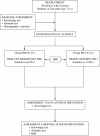A cluster-randomised clinical trial comparing two cardiovascular health education strategies in a child population: the Savinghearts project
- PMID: 23176593
- PMCID: PMC3524752
- DOI: 10.1186/1471-2458-12-1024
A cluster-randomised clinical trial comparing two cardiovascular health education strategies in a child population: the Savinghearts project
Abstract
Background: This paper describes a methodology for comparing the effects of an eduentertainment strategy involving a music concert, and a participatory class experience involving the description and making of a healthy breakfast, as educational vehicles for delivering obesity-preventing/cardiovascular health messages to children aged 7-8 years.
Methods/design: This study will involve a cluster-randomised trial with blinded assessment. The study subjects will be children aged 7-8 years of both sexes attending public primary schools in the Madrid Region. The participating schools (n=30) will be randomly assigned to one of two groups: 1) Group MC, in which the children will attend a music concert that delivers obesity-preventing/cardiovascular health messages, or 2) Group HB, in which the children will attend a participatory class providing the same information but involving the description and making of a healthy breakfast. The main outcome measured will be the increase in the number of correct answers scored on a knowledge questionnaire and in an attitudes test administered before and after the above interventions. The secondary outcome recorded will be the reduction in BMI percentile among children deemed overweight/obese prior to the interventions. The required sample size (number of children) was calculated for a comparison of proportions with an α of 0.05 and a β of 0.20, assuming that the Group MC subjects would show values for the measured variables at least 10% higher than those recorded for the subjects of Group HB. Corrections were made for the design effect and assuming a loss to follow-up of 10%. The maximum sample size required will be 2107 children. Data will be analysed using summary measurements for each cluster, both for making estimates and for hypothesis testing. All analyses will be made on an intention-to-treat basis.
Discussion: The intervention providing the best results could be recommended as part of health education for young schoolchildren.
Trial registration: Clinicaltrials.gov: NCT01418872.
Figures
References
-
- Mathers C, Boerma T, Fat DM. The global burden of disease: 2004 update. WHO 2008. Geneva, Switzerland: WHO Press; 2008.
-
- Instituto Nacional de Estadística. 2008. [Accessed June 2012]. Available from: http://www.ine.es/prensa/np588.pdf.
-
- Nader PR, O'Brien M, Houts R, Bradley R, Belsky J, Crosnoe R, Friedman S, Mei Z, Susman EJ. National Institute of Child Health and Human Development Early Child Care Research Network, Identifying risk for obesity in early childhood. Pediatrics. 2006;118(3):594–601. doi: 10.1542/peds.2005-2801. - DOI - PubMed
-
- CDC. 2010. [Accessed June 2012]. Available from: http://www.cdc.gov/obesity/childhood/index.html.


